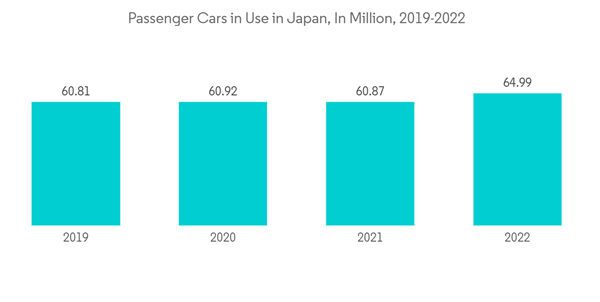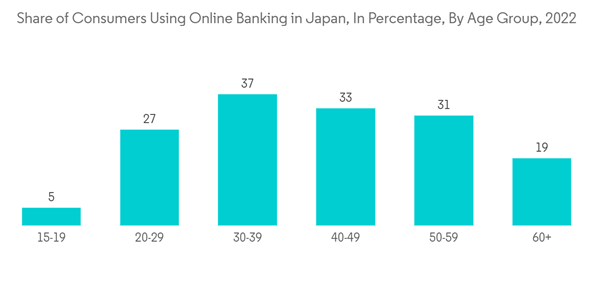The value of outstanding loans in Japan has observed a continuous rise over the years, signifying an increase in the number of loan policies being taken, including auto loans as well. In the passenger vehicles segment of the country, medium cars and minivans have more share in market sales, leading to loan providers focusing on certain sections of the auto loan market. Sales of commercial vehicles in the country are observing a continuous decline post covid resulting in loan providers shifting toward passenger vehicles to increase their market share. Rise in the level of default rate, inflation with a decline in wage rate growth, and government support measures are among the factors negatively affecting the industry.
With an existing lower interest rate on loans in the country, loan providers are majorly focusing on the rising price of automobiles, which is resulting in customers opting for auto loans to finance their vehicles and increase the business of automobile loan providers. Automobile manufacturers are coming up with their own finance companies to make it simple for buyers to buy the car. Toyota, Suzuki, Daihatsu, Honda, and Nissan are existing as leading sellers in Japan having their own finance companies such as Toyota Financial Services, Nissan Financial Services, and others.
Nagano, Gunma, Ibaraki, and Tochigi are among the cities in Japan with a leading automobile share of more than 65% of their population. The share of passenger vehicles in the country increases with distance away from cities because of the availability of public transportation facilities in the cities and is leading to population segment away from cities emerging as potential buyers of auto loans in the market. Post-COVID-19, with the emerging market of electric vehicles, the government is providing subsidies on the cost of electric vehicles as their price is relatively higher than conventional vehicles and is leading to the creation of new business opportunities for auto loan providers.
Japan Auto Loan Market Trends
Increasing Sales Of Passenger Vehicles
Post-COVID-19, sales of passenger vehicles in Japan are observing an increase with a continuous decline in sales of commercial vehicles. SUVs, medium cars, large cars, and full-sized vans are among the segments driving the growth of passenger vehicles, with other segments still observing a small decline in sales. As the economy is gaining strength after observing a negative decline during COVID-19, sales of new vehicles are coming up with strong growth of more than 20% in comparison to last year. Among the passenger vehicle sales, Toyota, Suzuki, Daihatsu, Honda, Nissan, and Mazda are existing as automobile manufacturers leading in auto sales in the country. In addition to this, sales of three-wheelers in the region are also observing positive growth, and combined with the fuel efficiency of launched electric vehicles, sales of passenger vehicles are expected to observe positive growth over the coming years and drive its loan segment business as well.Rising Online Banking
With an increase in business participation ranging from banks, fintech, NBFC, OEM, and other financial lenders in auto loans, there is continuously increasing competition in the market. As a result of this, loan providers are opting for digital technologies to make it affordable for users to borrow automobile loans and increase their market reach. Borrowers are finding it more comfortable to compare different auto loan offers of hybrid and online loan providers through their comfort place. Post-COVID-19, the net interest income of digital banks in Japan observed a continuous rise, leading to an increasing number of auto loan providers offering their products online. With an increasing number of lenders accepting the role of digital presence for improving their sales, banks, financial companies, and OEMs are investing in digitizing their loan process services, and this is an upcoming loan processing model for auto loans as well.Japan Auto Loan Industry Overview
The Japanese auto loan market is fragmented, with a continuously increasing number of players in the market. The rising price of automobiles is leading to an increasing number of people financing their vehicles through loans. Technological innovations in the banking industry are resulting in lenders offering their digital loan services to increase their reach and market size. Some of the existing players in the Japanese auto loan market are Maruhan Japan Bank, SMBC Trust Bank, Bank of Kyoto, and SBI Shinsei Bank.Additional Benefits:
- The market estimate (ME) sheet in Excel format
- 3 months of analyst support
This product will be delivered within 2 business days.










